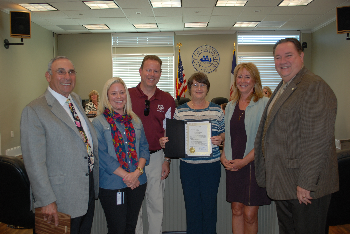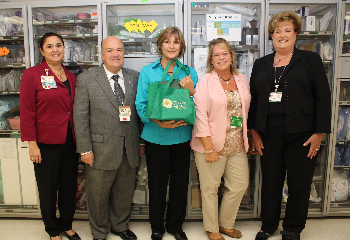 UTMB’s Center for Addiction Research was honored by Galveston’s City Council for its support of Substance Abuse Prevention Month. The center provided an impaired-driving simulator for a Substance Abuse Prevention Awareness event on Oct. 17 on the Texas A&M University at Galveston campus. In cooperation with the Galveston County Community Coalition of the Bay Area Council on Drugs and Alcohol, the center hosted a number of hands-on activities for the more than 500 who participated. The center’s impaired-driving simulator imitates the effects of distraction and impairment from alcohol and other drugs.
UTMB’s Center for Addiction Research was honored by Galveston’s City Council for its support of Substance Abuse Prevention Month. The center provided an impaired-driving simulator for a Substance Abuse Prevention Awareness event on Oct. 17 on the Texas A&M University at Galveston campus. In cooperation with the Galveston County Community Coalition of the Bay Area Council on Drugs and Alcohol, the center hosted a number of hands-on activities for the more than 500 who participated. The center’s impaired-driving simulator imitates the effects of distraction and impairment from alcohol and other drugs.
 Margaret Matthews, of SICU, was the October Daisy Award winner. She was nominated by her peers because "she exemplifies expert clinical skills and compassionate care. Our staff recognize her as an outstanding role model. On a recent holiday weekend, three trauma patients were admitted and Margaret was mentoring two nurses. Margaret coached the nurses to be able to provide care that meet her high standards as well as help admit the other patients. When we received one patient from the emergency room she was in critical condition. After completing a procedure with the patient a neurosurgeon stapled a gash on the young lady's face. Margaret insisted a plastic surgeon be consulted. A plastic surgeon came in the middle of the night to suture the deep gash properly and reduce scarring because of Margaret's persistence. She coordinated care with doctors and respiratory therapists to make sure the patient went to an urgent CT scan safely. Margaret continually updated the young patient's parents about her condition and treatments. As always Margaret showed her commitment to focusing on the patient's family as well as the patient."
Margaret Matthews, of SICU, was the October Daisy Award winner. She was nominated by her peers because "she exemplifies expert clinical skills and compassionate care. Our staff recognize her as an outstanding role model. On a recent holiday weekend, three trauma patients were admitted and Margaret was mentoring two nurses. Margaret coached the nurses to be able to provide care that meet her high standards as well as help admit the other patients. When we received one patient from the emergency room she was in critical condition. After completing a procedure with the patient a neurosurgeon stapled a gash on the young lady's face. Margaret insisted a plastic surgeon be consulted. A plastic surgeon came in the middle of the night to suture the deep gash properly and reduce scarring because of Margaret's persistence. She coordinated care with doctors and respiratory therapists to make sure the patient went to an urgent CT scan safely. Margaret continually updated the young patient's parents about her condition and treatments. As always Margaret showed her commitment to focusing on the patient's family as well as the patient."
 The UTMB medical team begins work on the ice as the summer season begins in Antarctica.
The UTMB medical team begins work on the ice as the summer season begins in Antarctica.
UTMB, working for the National Science Foundation as a subcontractor for Lockheed Martin’s Antarctic Support Contract, now manages all medical operations for the in Antarctica United States Antarctic Program - McMurdo Station, Amundsen-Scott South Pole Station and Palmer Station – as well as numerous seasonal field camps and two marine research vessels operated year round.
The National Science Foundation, an independent U.S. government agency, manages the U.S. Antarctic Program, through which it coordinates all U.S. scientific research on the southernmost continent and aboard ships in the Southern Ocean as well as related logistics support. Antarctica's remoteness and extreme climate make it a unique “natural laboratory” and even an analog for conditions on other planets.
Top row left to right: Cindy Rodriguez, Veronica Padron, Ruth Reyes, Yvette Vastbinder.
Bottom row: Eve Mora, Michelle Basci